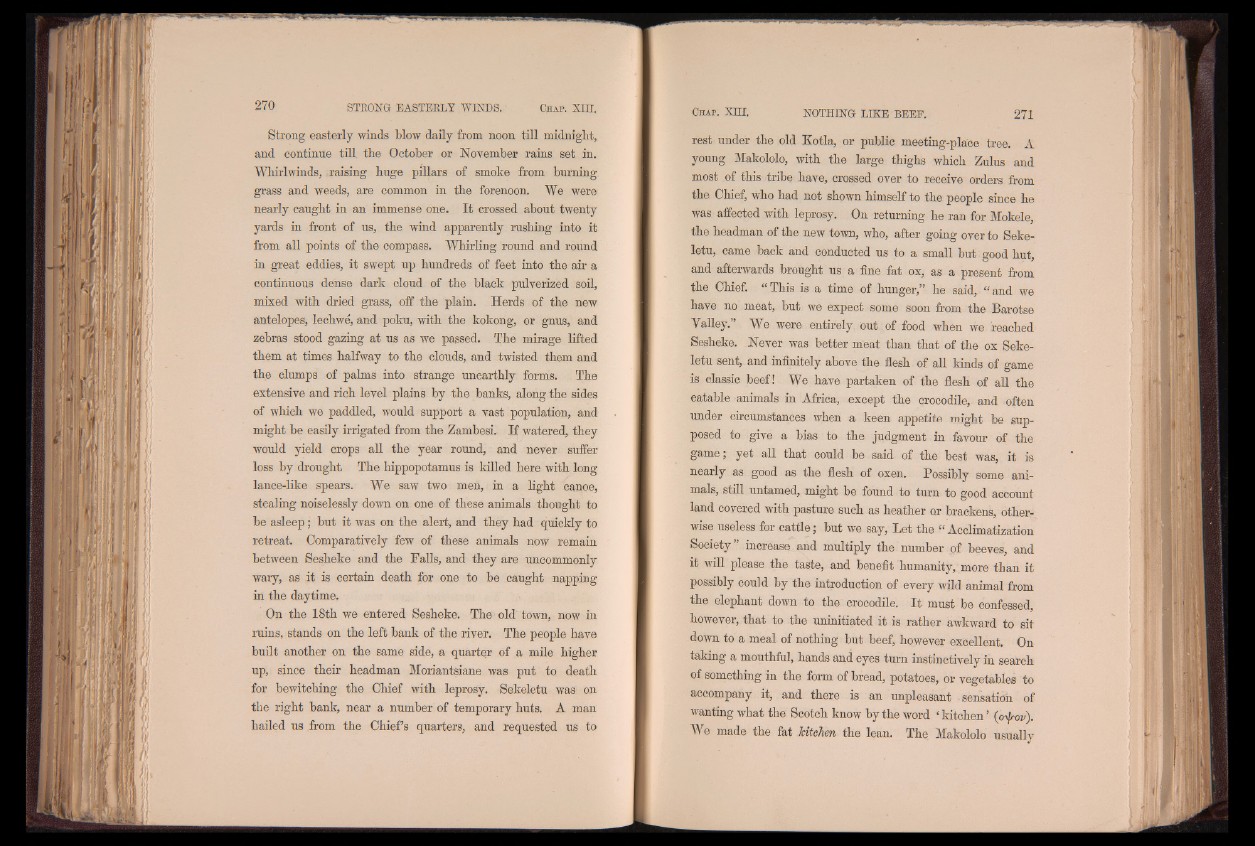
Strong easterly winds blow daily from noon till midnight,
and continue till the October or November rains set in.
Whirlwinds, raising huge pillars of smoke from burning
grass and weeds, are common in the forenoon. We were
nearly caught in an immense one. I t crossed about twenty
yards in front of us, the wind apparently rushing into it
from all points of the compass. Whirling round and round
in great eddies, it swept up hundreds of feet into the air a
continuous dense dark cloud of the black pulverized soil,
mixed with dried grass, off the plain. Herds of the new
antelopes, lechwe, and poku, with the kokong, or gnus, and
zebras stood gazing at us as we passed. The mirage lifted
them at times halfway to the clouds, and twisted them and
the clumps of palms into strange unearthly forms. The
extensive and rich level plains by the banks, along the sides
of which we paddled, would support a vast population, and
might be easily irrigated from the Zambesi. If watered, they
would yield crops all the year round, and never suffer
loss by drought The hippopotamus is killed here with long
lance-like spears. We saw two men, in a light canoe,
stealing noiselessly down on one of these animals thought to
be asleep; but it was on the alert, and they had quickly to
retreat. Comparatively few of these animals now remain
between Sesheke and the Falls, and they are uncommonly
wary, as it is certain death for one to be caught napping
in the daytime.
On the 18th we entered Sesheke. The old town, now in
ruins, stands on the left bank of the river. The people have
built another on the same side, a quarter of a mile higher
up, since their headman Moriantsiane was put to death
for bewitching the Chief with leprosy. Sekeletu was on
the right bank, near a number of temporary huts. A man
hailed us from the Chiefs quarters, and requested us to
rest under the old Kotla, or public meeting-pla'ce tree. A
young Makololo, with the large thighs which Zulus and
most of this tribe have, crossed over to receive orders from
the Chief, who had not shown himself to the people since he
was affected with leprosy. On returning he ran for Mokele,
the headman of the new town, who, after going over to Sebe-
letu, came back and conducted us to a small but good hut,
and afterwards brought us a fine fat ox, as a present from
the Chief. “ This is a time of hunger,” he said, “ and we
have no meat, but we expect some soon from the Barotse
Valley. ’ We were entirely out of food when we reached
Sesheke. Never was better meat than that of the ox Sekeletu
sent, and infinitely above the flesh of all binds of game
is classic beef! We have partaken of the flesh of all the
eatable animals in Africa, except the crocodile, and often
under circumstances when a keen appetite might be supposed
to give a bias to the judgment in favour of the
game; yet all that could be said of the best was, it is
nearly as good as the flesh of oxen. Possibly some animals,
still untamed, might be found to turn to good account
land covered with pasture such as heather or brackens, other-
wise useless for cattle j but we say, Let the “ Acclimatization
Society” increase and multiply the number of beeves, and
it will please the taste, and benefit humanity, more than it
possibly could by the introduction of every wild animal from
the elephant down to the crocodile. I t must be confessed,
however, that to the uninitiated it is rather awkward to sit
down to a meal of nothing but beef, however excellent. On
taking a mouthful, hands and eyes turn instinctively in search
of something in the form of bread, potatoes, or vegetables to
accompany it, and there is an unpleasant sensation of
wanting what the Scotch know by the word ‘ kitchen ’ {o^rov).
"We made the fat ’kitchen the lean. The Makololo usually